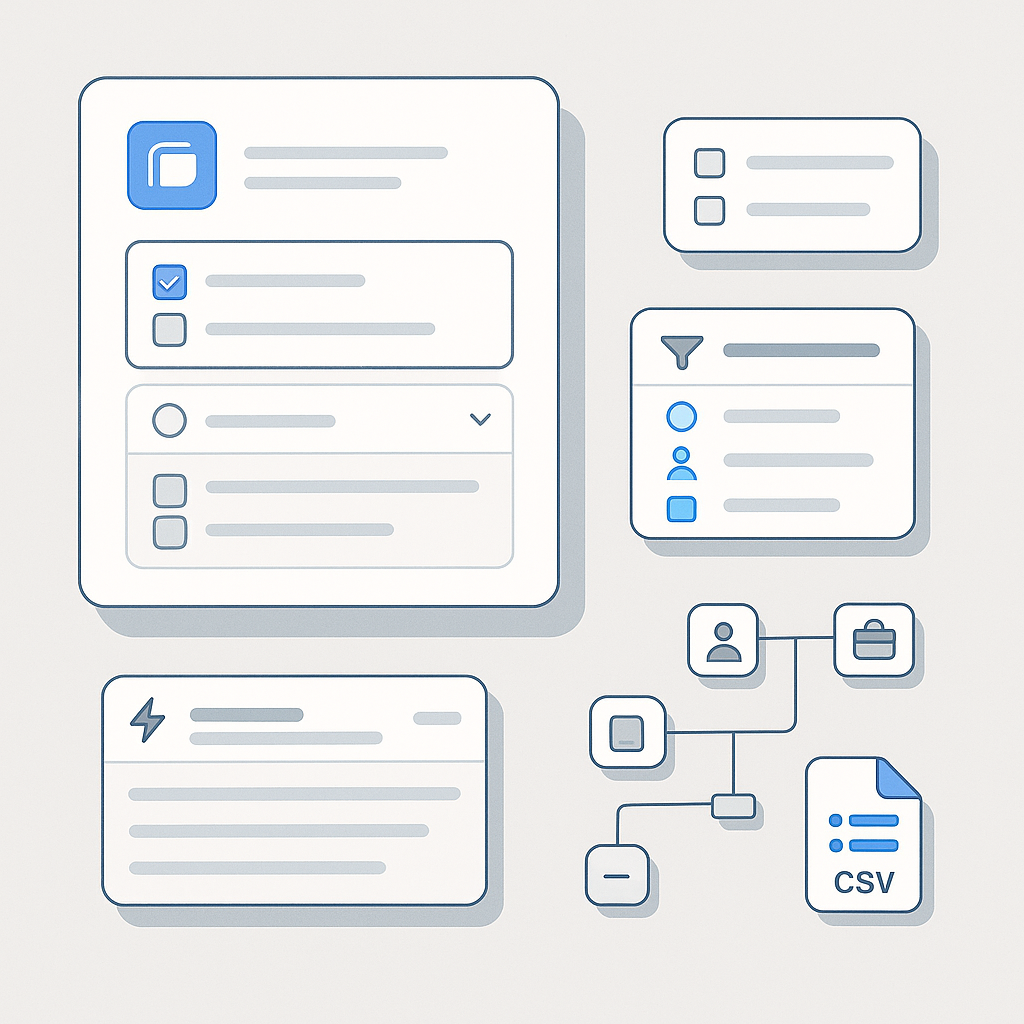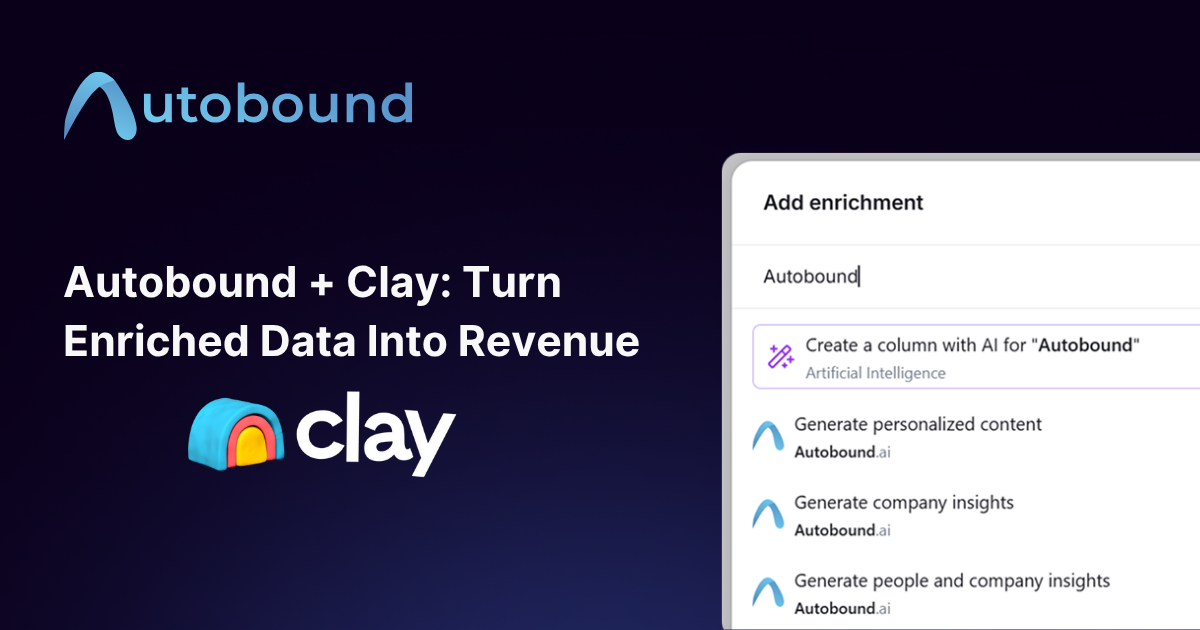Imagine this: you're a salesperson on a mission to connect with a Data Governance Manager (DGM). You're jazzed, ready to fire off an email that'll make them sit up and take notice. You pull up their LinkedIn profile, eager to inject some personalized charm, and BAM—you're suddenly drowning in a sea of "GDPR compliance," "data lineage," and enough technical jargon to make your head spin. Sound familiar?
Don't worry, you're not alone. Many sales and marketing strategies crash and burn when it comes to DGMs. They rely on tired, generic pitches that fail to resonate with the unique challenges and priorities of this increasingly critical role. It's like trying to sell a snow blower in Hawaii—the need might be there, but you're speaking the wrong language.
But here's the thing: selling to DGMs doesn't have to feel like navigating a minefield. By truly understanding their world, their pain points, and what a "win" looks like for them, you can transform these gatekeepers into powerful allies. This guide is your roadmap to doing just that. We'll dive deep into the DGM mindset, arm you with proven email templates that get responses, and share insider tips to level up your outreach game.
Decoding the DGM: Who They Are and What Keeps Them Up at Night
Gone are the days when DGMs were confined to the back office, lost in a world of spreadsheets and compliance audits. Today, they've emerged as strategic powerhouses, wielding significant influence over budget decisions and technology adoption within their organizations. Think of them as the conductors of the data orchestra, ensuring everything runs smoothly, securely, and in harmony with ever-evolving regulations.
So, What Exactly Does a DGM Do?
In a nutshell, DGMs are the architects of an organization's data landscape. They establish the policies, procedures, and frameworks that ensure data is treated like the valuable asset it is—accurate, consistent, secure, and compliant. They're the guardians of data integrity, the protectors against breaches, and the champions of using data to drive better business decisions.
If you were to peek at a DGM's to-do list, you'd likely find tasks like:
- Building and implementing data governance frameworks: Think of this as creating the blueprint for how data is managed, accessed, and used across the entire organization.
- Setting data quality standards and metrics: Just like a five-star chef insists on the freshest ingredients, DGMs establish benchmarks to ensure data is accurate, reliable, and trustworthy.
- Leading the charge on data security and privacy: With data breaches becoming increasingly common, DGMs are on the front lines of protecting sensitive information and ensuring compliance with regulations like GDPR and CCPA.
- Ensuring compliance with a maze of regulations: From GDPR to CCPA and beyond, DGMs are masters at navigating the ever-changing landscape of data privacy laws and ensuring their organization stays on the right side of compliance.
The DGM's Biggest Pain Points (and How You Can Be Their Hero)
DGMs might have a fancy title, but their days are often filled with challenges that can make their job feel like an uphill battle. By understanding these pain points, you can position your solution as the much-needed solution they've been searching for.
Data Silos: The Puzzle with Missing Pieces
Imagine trying to assemble a 1,000-piece puzzle where the pieces are scattered across different rooms, hidden in drawers, and stashed under furniture. That's the reality for many DGMs grappling with data silos. Different departments hoard their own data, making it nearly impossible to get a complete, accurate view of the organization's information. This fragmentation leads to inefficiencies, poor decision-making, and a whole lot of frustration for DGMs.
Regulatory Compliance: The Sword of Damocles
With data privacy regulations becoming increasingly stringent and carrying hefty fines for non-compliance, DGMs are under immense pressure to ensure their organization's data practices are squeaky clean. It's a constant game of catch-up as new regulations emerge, and the consequences of failing to comply can be catastrophic.
Data Quality: Separating the Signal from the Noise
In the age of Big Data, it's not just about the quantity of data but the quality. DGMs are tasked with ensuring data is accurate, consistent, and reliable. But with data pouring in from multiple sources, often riddled with errors and inconsistencies, maintaining data quality can feel like an endless game of whack-a-mole.
What Does a DGM Consider a "Win"?
To effectively sell to DGMs, you need to speak their language and align your messaging with their definition of success. Here's what they're striving for:
- Improved Data Quality and Consistency: They dream of a world where data is accurate, reliable, and consistent across the entire organization.
- Reduced Risk of Data Breaches and Fines: They want to sleep soundly at night knowing their organization's data is secure and compliant with all relevant regulations.
- Increased Efficiency and Productivity: They're always looking for ways to streamline data management processes, reduce manual effort, and free up their team to focus on more strategic initiatives.
- Better Decision-Making Based on Reliable Data: Ultimately, DGMs want to empower their organization to make smarter, data-driven decisions that drive growth and success.
By understanding their priorities and KPIs, you can position your solution as the key to achieving these goals and becoming a true partner in their data governance journey.
Stop Sending Generic Emails! Here Are Templates That Get DGMs to Open, Click, and Respond
Let's face it: DGMs are bombarded with more emails than they can shake a stick at. To cut through the noise and capture their attention, you need to ditch the generic sales pitches and craft messages that resonate on a personal level. Remember, personalization is key!
Email Template 1: The "Data Headache" Opener
- Subject: \[Prospect Name], Is \[Data Silo Management] Keeping You Up at Night?
This subject line is designed to pique their curiosity and tap into a pain point they're likely experiencing. It's direct, relatable, and suggests you understand their world.
- Body:
Start by acknowledging a common data governance challenge relevant to their industry or role. For example, you could say something like:
"Hi \[Prospect Name],
I was recently reading an article about the increasing challenges of maintaining data quality in the \[Prospect's Industry] industry, and it made me think of you. With data volumes exploding and regulations becoming more complex, it's no wonder DGMs are feeling the pressure."
Then, briefly introduce your solution as a way to alleviate this specific pain point. Don't get bogged down in technical details just yet; focus on the benefits and how it can make their life easier.
- Call to action:
Invite them to a quick discovery call to discuss their specific challenges and explore how your solution can help. You could say something like:
"Would you be open to a quick 15-minute call next week to discuss your data governance initiatives and see if \[Your Solution] could be a good fit for your needs?"
Email Template 2: The "Social Proof" Approach
- Subject: How \[Acme Corporation] Solved \[Data Compliance Challenges] and Improved \[Reporting Efficiency]
This subject line leverages the power of social proof by showcasing a success story from a company similar to theirs. It immediately grabs their attention and suggests you have solutions that deliver tangible results.
- Body:
Start by highlighting a specific data challenge that \[Acme Corporation] was facing, and then dive into how your solution helped them overcome it. Be sure to quantify the results whenever possible. For example, you could say:
"Hi \[Prospect Name],
I recently had the pleasure of working with \[Acme Corporation], a company in the same industry as yours, who was struggling with \[Data Challenge]. By implementing \[Your Solution], they were able to \[Quantifiable Result], such as improving data quality by 20% or reducing the time it takes to comply with audits by 50%.
- Call to action:
Offer a free consultation or demo to show them how your solution can help them achieve similar success. You could say:
"I'd love to schedule a brief demo to show you how \[Your Solution] can help you achieve similar results. Are you available for a quick call next week?"
Email Template 3: The "Value-Packed Resource" Offer
- Subject: Your Guide to \[Streamlining Data Compliance]
This subject line offers a valuable resource that directly addresses a key DGM goal. It positions you as a helpful resource rather than a pushy salesperson.
- Body:
Start by briefly explaining the value of the resource and how it can help them achieve a specific goal. For example, you could say:
"Hi \[Prospect Name],
I know that \[Achieving Specific DGM Goal] is a top priority for many DGMs, so I wanted to share a valuable resource that can help. Our latest white paper, "\[5 Steps to Streamlined Compliance]," provides actionable tips and best practices for \[Specific DGM Goal]."
- Call to action:
Provide a clear and easy way to access the resource, such as a link to download it from your website. You could say:
"You can download your free copy of the white paper here: \[Link]"
Pro Tip: Don't be afraid to experiment! A/B test different subject lines and email copy to see what resonates best with your target audience. The more you test, the better you'll understand what makes DGMs tick.
8 Proven Tactics to Level-Up Your DGM Outreach Game
Crafting compelling email templates is just the tip of the iceberg. To truly excel at selling to DGMs, you need a strategic approach that goes beyond the inbox and focuses on building genuine relationships.
- Speak Their Language: Remember that scene in "Lost in Translation" where Bill Murray is bombarded with nonsensical Japanese advertising jargon? Don't be that salesperson. DGMs care about business outcomes, not technical specs. Use clear, concise language that focuses on the value and benefits your solution provides.
- Personalization is King (or Queen): In the world of B2B sales, personalization goes beyond simply addressing the DGM by name. Take the time to research their company, industry, and recent news to tailor your message and demonstrate genuine interest. Did their company recently experience a data breach? Mention it! Did they just publish a thought leadership piece on data governance? Reference it! The more relevant you can make your outreach, the more likely they are to engage.
- Focus on Value, Not Features: Imagine going on a date with someone who spends the entire time talking about their impressive list of accomplishments and accolades. Not exactly a recipe for a second date, right? The same principle applies to selling to DGMs. Instead of bombarding them with a laundry list of features, focus on how your solution directly addresses their pain points and helps them achieve their goals. Remember, it's not about what your product does; it's about what it does for them.
- Use Data to Tell a Story: Everyone loves a good story, especially when it's backed by cold, hard facts. Instead of making vague promises, use data points, statistics, and case studies to illustrate the value of your solution. Did your solution help a company reduce data breaches by 40%? Shout it from the rooftops! Did it enable a team to improve data quality by 25%? Let the numbers speak for themselves! Quantifiable results are far more persuasive than empty claims.
- Build Relationships, Don't Just Sell: DGMs, like most humans, are more likely to do business with people they know, like, and trust. Instead of approaching every interaction with a "sell, sell, sell" mentality, focus on building genuine relationships. Engage with their content on LinkedIn, share relevant articles, and participate in industry events. The more you nurture the relationship, the more receptive they'll be to your message when the time is right.
- Follow Up Strategically (But Don't Be a Stalker): In the world of sales, persistence is key, but there's a fine line between following up and becoming a nuisance. Don't give up after one email, but don't bombard them with daily messages either. A well-timed and personalized follow-up can make all the difference in keeping the conversation going. Consider setting reminders to follow up after a week, two weeks, and a month. And when you do follow up, provide value by sharing a relevant article, case study, or industry insight.
- Leverage the Power of Social Selling: LinkedIn is your secret weapon for connecting with DGMs and building relationships. Optimize your profile to highlight your expertise in data governance, join relevant groups, and engage with DGMs' content. Share your own thought leadership pieces, comment on their posts, and participate in industry discussions. The more visible you are in the data governance space, the more likely you are to be seen as a trusted advisor.
- Don't Underestimate the Power of Referrals: Remember that warm, fuzzy feeling you get when a friend recommends a great restaurant or movie? The same principle applies to B2B sales. Warm introductions from trusted sources can make all the difference in getting your foot in the door with DGMs. Reach out to your network, connect with industry influencers, and don't be afraid to ask for referrals.
Data Governance is Here to Stay: Are You Ready to Connect With DGMs?
In today's data-driven world, DGMs are no longer just gatekeepers—they're strategic partners, key influencers, and decision-makers. Ignoring them means missing out on valuable opportunities to drive growth, revenue, and innovation.
By shifting your mindset from "selling to anyone" to "selling to the right people," and by embracing a targeted, personalized, and value-driven approach, you can unlock the immense potential of the DGM market. Remember, it's not about closing the deal; it's about building lasting relationships that benefit both parties. So, go forth, embrace the world of data governance, and watch your sales soar!
About Autobound
Autobound's leading AI-powered platform delivers 350+ unique insights for go-to-market teams from financial filings, social media activity, 35 news events, competitor trends, job changes and more. Trusted by 7,000+ companies including TechTarget and validated by 220+ 5-star G2 reviews, we're unlocking hyper-personalization at scale, with native integrations for Salesloft, Outreach, and more. Leverage our developer-friendly API, try our Chrome extension, try our platform free, or contact our team to eliminate guesswork and drive measurable growth →
Built with love in San Francisco, CA




